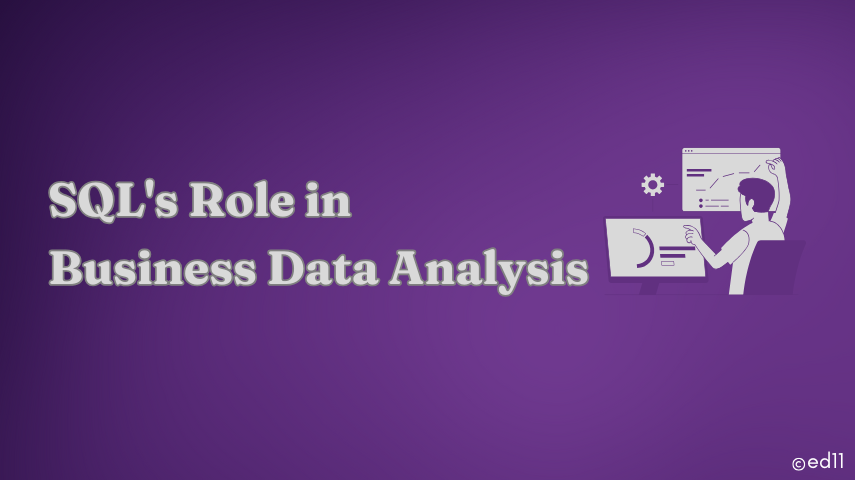
As I, a Sr. Data Analyst, navigate through vast amounts of data daily, I have realized the immense value of SQL for Business Data Analysts. SQL Structured Query Language is the backbone of data management and is crucial for extracting, analyzing, and making sense of business data. In today's data-driven world, SQL is a must-have skill for every Business Data Analyst.
What is SQL for Business Data Analysts
SQL (Structured Query Language) is a tool that helps Business Data Analysts work with data stored in databases. It allows them to retrieve, filter, and analyze data quickly and efficiently. With SQL, they can generate reports, track business performance, and find useful insights. It also helps in organizing and cleaning raw data for better decision-making. SQL is an essential skill for Business Data Analysts to manage and understand business data.
Futures of SQL for Business Data Analysts
SQL continues to be an essential tool for Business Data Analysts. As data grows, SQL is evolving to handle more complex tasks efficiently. Here are some key future trends.
- AI and Automation in SQL: SQL is becoming smarter with AI-powered automation. Business Data Analysts will use AI-driven SQL queries to generate insights faster, reducing manual work.
- Integration with Big Data: SQL is improving to work with large datasets in cloud platforms like Google BigQuery and Amazon Redshift. This allows analysts to handle massive data efficiently.
- Real-Time Data Processing: Future SQL systems will focus on real-time data analysis. Business Data Analysts will get instant insights, helping businesses make faster decisions.
- Enhanced Security and Compliance: SQL security features will become stronger to protect sensitive business data. Analysts will use advanced encryption and access control to prevent data breaches.
- More User-Friendly SQL Tools: SQL tools will become easier to use, allowing non-technical professionals to work with data. This will make business analytics more accessible to everyone.
The Importance of SQL for Business Data Analysts
Efficient Data Retrieval
Business Data Analysts play a key role in handling business information efficiently. SQL allows them to retrieve sales, customer, and financial data with ease. Instead of manually searching through spreadsheets, they can run queries to pull specific insights instantly. This helps businesses track performance, identify trends, and make data-driven decisions. SQL also improves accuracy by reducing human errors in data retrieval. Analysts can filter, sort, and group data based on business needs. With SQL, reports and insights can be generated in real time. This speed and efficiency make SQL an essential tool for any Business Data Analyst.
Data Manipulation and Cleaning
Raw data often contains duplicate entries, missing values, and inconsistencies, making it difficult to analyze. Business Data Analysts use SQL functions like WHERE, GROUP BY, and ORDER BY to clean and organize data effectively. They can remove unwanted records, standardize formats, and fill in missing information. SQL also helps in identifying and correcting errors to ensure accuracy. Without proper data cleaning, reports and insights may be unreliable. Clean data allows businesses to make well-informed decisions based on accurate information. By using SQL, analysts save time and improve efficiency in data preparation. This step is crucial for high-quality analysis and reporting.
Combining Multiple Data Sources
Companies store data in various tables, such as sales, customers, and inventory. A Business Data Analyst uses SQL to merge these tables and analyze the complete dataset. By using JOIN operations, they can connect related information, like matching customer purchases with their demographics. This helps in understanding buying patterns, improving marketing strategies, and forecasting demand. Without SQL, analyzing data from multiple sources would be time-consuming and error-prone. Combining data also helps businesses track overall performance and identify areas for improvement. With accurate and well-structured data, companies can make smarter, data-driven decisions that boost efficiency and profits.
Generating Business Insights
SQL allows Business Data Analysts to track key business metrics such as revenue growth, customer retention, and sales performance. By running queries, they can compare past and present data to identify trends and patterns. These insights help businesses understand what is working well and what needs improvement. SQL also helps in segmenting customers based on their buying behavior, allowing businesses to create targeted marketing campaigns. Analysts can monitor product demand and adjust inventory levels accordingly. Real-time data analysis enables quick decision-making, reducing risks and maximizing profits. With SQL, businesses can make smarter, data-driven strategies to stay ahead of the competition.
Automating Reports and Dashboards
SQL helps Business Data Analysts automate reports, reducing the need for manual updates. With SQL queries, they can pull real-time data directly from databases into reporting tools like Tableau and Power BI. These tools refresh dashboards automatically, ensuring businesses always have the most up-to-date information. Automated reports save time, minimize human errors, and improve accuracy in business analysis. Companies can track sales, customer trends, and financial performance instantly. This allows managers to make quick, data-driven decisions without waiting for manual reports. SQL automation boosts efficiency, helping businesses stay competitive in fast-moving industries.
Improved Decision-Making
SQL allows Business Data Analysts to extract valuable insights from large datasets, helping businesses identify trends and patterns. By analyzing customer behavior, sales performance, and market trends, they can recommend strategies for growth. With SQL, businesses can optimize operations, reduce costs, and improve customer satisfaction. Quick access to accurate data helps managers make informed choices, avoiding guesswork. Predictive analysis using SQL enables businesses to forecast future trends and prepare accordingly. Automating reports with SQL ensures that decision-makers always have up-to-date information. Real-time data analysis allows companies to respond quickly to changes in the market. In short, SQL empowers Business Data Analysts to drive smarter, data-backed decisions for business success.
Enhancing Data Security
Business Data Analysts work with confidential business data, including financial records, customer details, and company performance metrics. SQL provides security features like role-based access control, ensuring only authorized users can view or modify specific data. By setting permissions, businesses can prevent unauthorized access and data breaches. SQL also supports encryption, making data more secure from cyber threats. Regular audits and access logs help track any suspicious activities. This ensures compliance with data protection laws and industry regulations. Secure data management builds trust with customers and stakeholders. A well-protected database keeps business operations smooth and risk-free.
How Business Data Analysts Use SQL in Daily Tasks
- Extracting Sales Data: A Business Data Analyst can use SQL queries to retrieve monthly sales data and analyze trends. This helps businesses understand their performance and make informed decisions.
- Customer Segmentation: SQL allows Business Data Analysts to group customers based on their purchase history, behavior, and demographics. This helps businesses target the right audience with personalized marketing strategies.
- Inventory Management: By using SQL, Business Data Analysts can track inventory levels, monitor stock movement, and forecast demand. This ensures that businesses maintain optimal stock levels and avoid shortages or overstocking.
- Financial Reporting: SQL is used to generate reports on revenue, profit, and expenses. Business Data Analysts analyze these reports to help companies manage budgets, reduce costs, and maximize profits.
- Marketing Campaign Analysis: With SQL, Business Data Analysts measure the effectiveness of marketing campaigns by tracking customer responses, sales conversions, and return on investment (ROI). This helps businesses refine their strategies for better results.
Must-Know SQL Skills for Business Data Analysts
To be a successful Business Data Analyst, mastering SQL is essential. Some key SQL skills include:
- SELECT Queries: Retrieving specific data from databases.
- JOINs: Combining multiple tables for analysis.
- Aggregations: Using functions like COUNT, SUM, and AVERAGE.
- Filtering Data: Using WHERE and HAVING clauses.
- Sorting and Grouping: Organizing data for meaningful insights.
- Subqueries and CTEs: Writing complex queries efficiently.
As a Sr. Data Analyst, I cannot stress enough the importance of SQL for Business Data Analysts. It is a powerful tool that helps Business Data Analysts extract, clean, and analyze data efficiently. Whether it’s generating reports, automating dashboards, or supporting decision-making, SQL is an indispensable skill for every Business Data Analyst. If you aspire to grow in the field, learning SQL is the first step toward becoming a proficient Business Data Analyst.

























